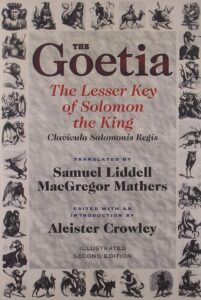


The Goetia (pronounced Go-EY-sha) is a grimoire that contains instructions for summoning and controlling 72 demons, who are said to be the servants of King Solomon. The book is part of a larger collection of magical texts called the Lesser Key of Solomon, which was compiled in the 17th century by unknown authors.
The Goetia is based on earlier sources of Jewish, Christian, and Arab origin, and draws on the legends of Solomon’s wisdom and power. The book provides the names, ranks, seals, and descriptions of the demons, as well as the rituals and tools needed to evoke them. The book also warns of the dangers and difficulties of dealing with these spirits, who are often rebellious and deceitful. The Goetia is one of the most influential and controversial books of Western occultism and has inspired many practitioners and writers throughout history.
The Goetia has been translated into several languages, but one of the most popular versions is the one by Samuel Liddell MacGregor Mathers, a British occultist and co-founder of the Hermetic Order of the Golden Dawn. Mathers translated the Goetia from a Latin manuscript in the British Museum in 1888 and published it in 1904 with an introduction by his friend and fellow occultist Aleister Crowley. Mathers’ translation is not without errors and omissions, but it remains a valuable source for students of ceremonial magic.
Mathers was born on January 8, 1854 in Hackney, London. He was interested in mysticism and symbolism from a young age and studied classical languages, Celtic folklore, and military tactics. He became a Freemason in 1877 and joined several esoteric societies, such as the Societas Rosicruciana in Anglia (S.R.I.A.) and the Hermetic Society. In 1887, he co-founded the Hermetic Order of the Golden Dawn with William Wynn Westcott and William Robert Woodman. The Golden Dawn was a secret society that taught its members various aspects of occultism, such as astrology, alchemy, tarot, kabbalah, and magic. Mathers was the chief of the Second Order of the Golden Dawn, which focused on practical magic. He wrote many rituals and teachings for the order, based on his extensive research and translations of ancient manuscripts.
Mathers was also a prolific author of books on occult topics, such as The Kabbalah Unveiled (1887), The Key of Solomon the King (1889), The Book of the Sacred Magic of Abramelin the Mage (1897), and The Tarot (1888). He also translated several works from French, such as Eliphas Levi’s The History of Magic (1913) and Papus’ The Tarot of the Bohemians (1889).
Many of the demons in the Goetia can be traced back to earlier sources, such as Johann Wier’s Pseudomonarchia Daemonum (1577) and Collin de Plancy’s Dictionnaire Infernal (1818). These works were based on medieval grimoires that claimed to reveal the secrets of Solomon’s magic. However, some scholars have argued that the Goetia is not a genuine Solomonic text, but a product of Christian demonology that reflects the fears and prejudices of its authors. For example, Gershom Scholem, a renowned scholar of Jewish mysticism, described the book as “a melange of Jewish, Christian, and Arab elements in which the kabbalistic component was practically nil.” (Scholem, Kabbalah)
The Goetia offers a glimpse into a world where humans can communicate with powerful and dangerous entities that may or may not be loyal to their commands. It also raises ethical and philosophical questions about the nature and purpose of magic and its relation to religion and morality. As Crowley wrote in his introduction to Mathers’ translation:
“The spirits of the Goetia are portions of the human brain… Their seals therefore represent (Mr. Spencer’s projected cube) methods of stimulating or regulating those particular spots (through the eye). The names of God are vibrations calculated to establish: (a) General control of brain. (Establishment of functions relative to subtle world.) (b) Control over brain in detail. (Rank or type of function.) (c) Control over one special portion.”
– The Goetia: The Lesser Key of Solomon the King (pg 17)